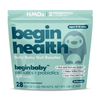Top Infant Formula Ingredients To Look for According to Experts
share this article
 Choosing the right infant formula is one of the most important decisions parents make when feeding their baby.
Choosing the right infant formula is one of the most important decisions parents make when feeding their baby.
While all infant formulas provide essential nutrients for growth and development, some contain specialized ingredients that offer added benefits. Choosing the right mixture of nutrients is a crucial step in making formula feeding similar to breastfeeding, while ensuring your baby receives the necessary nutrients to grow up healthy and strong.
Why Infant Formula Ingredients Matter
The food your kiddo has early in their life plays a big role in their growth and development, so it's natural for parents to pay close attention to the infant formula ingredients list.
You're likely wondering about safety, digestibility, and how closely formulas mimic breast milk, since human milk benefits are well established. The quality of ingredients can vary between organic vs. regular infant formula, but all infant formulas sold in the U.S. must meet FDA standards for safety.
A formula-fed baby's microbiome needs the same support as a human milk-fed baby's microbiome. Choosing the right ingredients can help them build strong, healthy, balanced gut flora.
Top Ingredients in Infant Formula Parents Should Check
Which ingredients matter? What are the ingredients in infant formula? Paying attention to these key nutrients can help ensure your baby gets the most from the formula you choose.
Proteins: The Building Blocks of Growth
Proteins are essential for your baby's growth and development, providing the amino acids needed for healthy tissue and organ formation. In breast milk, protein comes in two main forms: whey and casein:
- Whey protein digests quickly, making it easy on your baby's stomach.
- Casein protein breaks down more slowly, which can lead to fussiness due to gas for sensitive infant tummies.
Breast milk naturally has a higher whey-to-casein ratio, making it easier for infants to digest [4]. Many infant formulas mimic this ratio, helping reduce gas, fussiness, and constipation. Look for formulas labeled "partially hydrolyzed" if your baby experiences digestive discomfort.
Important Fats in Infant Formula (DHA and ARA)
Docosahexaenoic acid (DHA) and arachidonic acid (ARA) are polyunsaturated fatty acids crucial for brain and eye development. These nutrients are naturally found in breast milk, and many formulas now include them to support cognitive and visual growth. Research has shown that infants consuming DHA-enriched formulas perform better on visual acuity tests compared to those who do not [3]. Long-term studies also suggest that getting enough ARA and DHA during infancy can support a kid's problem-solving, memory, and language skills as they grow.
Begin Health Expert Tip
When choosing a formula, look for DHA and ARA sourced from non-hexane extraction processes for added peace of mind. These omega-3 and omega-6 fatty acids are vital for your baby's brain and eye health development [6]. Look for high-quality formulas that use algae oil as a safer, plant-based source of DHA.
Carbohydrates (Lactose vs. Other Sugars)
Lactose, the primary carbohydrate in breast milk, is a preferred source of energy for infants. Some formulas replace lactose with corn syrup or other sugars. While these alternatives provide calories, they may not be as gentle on your baby's digestion. In reality, added sugars can be harder for some babies to tolerate and may lead to rapid weight gain, bloating, discomfort, or other issues.
When possible, choose a formula that uses lactose as the main carbohydrate to mimic breast milk's natural composition. To see more on corn syrup and other sugars, as well as additives you may want to avoid, check out the top list of ingredients to avoid in baby formula.
Prebiotics and Probiotics
A healthy gut microbiome is essential for digestion, immunity, and overall well-being.
Prebiotics, like galacto-oligosaccharides (GOS), fructo-oligosaccharides (FOS), and Human Milk Oligosaccharides (HMOs), serve as food for beneficial gut bacteria. Probiotics, such as Bifidobacterium strains, introduce live, healthy bacteria into the gut.
Research suggests probiotics and prebiotics in infant formula may help reduce colic, diarrhea, and constipation, mimicking the benefits of breastfeeding [2] In fact, prebiotics may help improve stool softness and frequency. They may also help alleviate discomfort in colicky infants by rebalancing the microbiome.
Human Milk Oligosaccharides (HMOs)
Human Milk Oligosaccharides (HMOs), such as the ones found in Beginbaby Prebiotic + Probiotics, are sugars naturally present in breast milk that play a vital role in infant gut health and immunity. They are technically classified as prebiotics that help feed beneficial bacteria in the gut and protect against infections by preventing harmful pathogens from binding to the intestinal lining. A growing number of formulas now include 2’-Fucosyllactose (2’-FL), the most abundant HMO in breast milk. Studies show that HMOs may support a stronger immune system and promote a balanced gut microbiome [5].
Remember, HMOs help support the gut and immunity by:
-
Feeding beneficial bacteria such as Bifidobacteria, encouraging their growth and strengthening the intestinal barrier
-
Acting as decoys to block harmful pathogens that could otherwise bind to the lining of the gut
Essential Vitamins and Minerals
All infant formulas must meet strict guidelines for vitamins and minerals, including iron fortification, calcium, vitamin D, and zinc, to support bone health and immune function.
However, some premium formulas may include higher-quality sources or additional nutrients like choline and lutein to support cognitive and eye development.
Ingredients To Avoid in Infant Formula
Not all formulas are made equally, especially when it comes to European vs U.S. baby formulas. For example, many U.S. formulas use fillers such as corn syrup solids, whereas European formulas typically use lactose. Or, as another example, there can be differences between organic and nonorganic formulas. Organic infant formula ingredients usually rely on lactose as the main carbohydrate, while other formulas may include fillers like corn syrup solids instead of lactose. Being aware of certain ingredients can help you make a safer, more informed choice when you're choosing baby formula for the first time.
Some ingredients to avoid include:
- Added sugars, such as corn syrup solids or sucrose
- Palm oil or palm olein, which can negatively affect calcium absorption and may contribute to constipation in some babies
- Artificial flavors, preservatives, or colors, which don't add any nutritional value to the formula.
How To Choose the Best Infant Formula Ingredients for Your Baby
With so many options available, a simple checklist can make comparing labels and choosing the right formula easier. Remember to:
- Look for iron fortification to prevent anemia and support healthy growth
- Look for lactose as a main carbohydrate, so you know the formula isn't filled with corn syrup solids or added sugars
- Be sure DHA and ARA are included to support brain and eye development as your baby grows
- Have a preference for formulas with HMOs and prebiotics, as these will help strengthen your baby's immunity and digestion
Every baby has different needs, so remember to consult a pediatrician before you make a final decision on a formula. To provide additional support for your baby's gut and immune health, Beginbaby Prebiotics + Probiotics provides both HMOs and beneficial bacteria that work together to help build a strong and healthy gut. Keeping kids' gut health nutrientsin mind can help your baby's microbiome thrive as they grow.
Key Takeaways
-
There are many options of baby formulas available for your baby. One with lactose as a main carbohydrate, iron fortification to prevent anemia, and DHA/ARA for brain and eye development helps your baby grow.
-
Formulas with HMOs and prebiotics help strengthen your child's digestion and immunity.

















